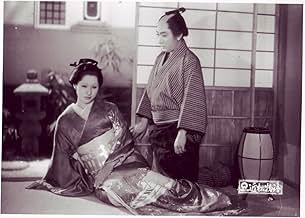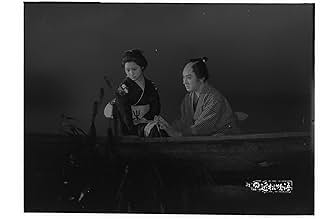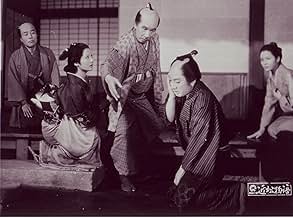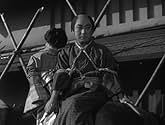IMDb-BEWERTUNG
8,0/10
5228
IHRE BEWERTUNG
Ishun ist ein wohlhabender, aber unsympathischer Meisterdrucker, der seine Frau und seinen besten Angestellten zu Unrecht beschuldigt hat, Liebhaber zu sein. Um der Bestrafung zu entgehen, r... Alles lesenIshun ist ein wohlhabender, aber unsympathischer Meisterdrucker, der seine Frau und seinen besten Angestellten zu Unrecht beschuldigt hat, Liebhaber zu sein. Um der Bestrafung zu entgehen, rennen die Angeklagten gemeinsam weg.Ishun ist ein wohlhabender, aber unsympathischer Meisterdrucker, der seine Frau und seinen besten Angestellten zu Unrecht beschuldigt hat, Liebhaber zu sein. Um der Bestrafung zu entgehen, rennen die Angeklagten gemeinsam weg.
- Auszeichnungen
- 1 Gewinn & 2 Nominierungen insgesamt
Eitarô Ozawa
- Sukeemon
- (as Sakae Ozawa)
Empfohlene Bewertungen
The only print of CHIKAMATUS MONOGATARI I've been able to find was abysmal - I almost couldn't watch it. Which is a shame as this is among the greatest Mizoguchi films. The story - which I believe had been done before and since by other Japanese directors - is a bit straighter than my favorite Mizoguchi films (SANSHO THE BAILIFF and UGETSU MONOGATARI), and is essentially a tale of tragic romance, in this case a transgressive romance that crosses strict class boundaries. As always with Mizoguchi, there is an exquisitely expressed tone of defiance, and - bad print aside - I was very pleased. As with all of Mizoguchi's films, I'm eagerly awaiting a restored DVD release - whenever that may come...
This film was near the end of a wonderful sequence of films made near the end of his life by Mizoguchi. As Tony Raines says in the DVD extra for the Masters of Cinema edition this was a studio project that he was not wholly enthusiastic about. This shows a little in the film as it lacks some of the real flair and emotional power of some of his earlier great films. However, it shares with them his wonderful flowing camera and great cinematography. Its also a terrific story, based originally on a story from the great Japanese 17th Century playwright Monzaemon Chikamatsu (hence the Japanese name, A Tale from Chikamatsu). The screenplay is skillfully worked from the original story, which depends a lot of some pretty unlikely coincidences.
The film has a great cast, although the lead actor (and major star at the time) Kazuo Hazegawa is a little old for the role of the shy lover. Kyoko Kagawa is great as the wife of a powerful merchant who is mistakenly accused of having an affair with her servant, but then falls in love with him as they both go on the run.
As you'd expect from a Mizoguchi film, technically it is flawless, with lovely sets and some beautiful camera work. The Masters of Cinema version on DVD is a beautiful restoration. For Mizoguchi fans, this film is well worth getting, but for those who haven't seen many of his films it would be better to start with some of his earlier masterpieces.
The film has a great cast, although the lead actor (and major star at the time) Kazuo Hazegawa is a little old for the role of the shy lover. Kyoko Kagawa is great as the wife of a powerful merchant who is mistakenly accused of having an affair with her servant, but then falls in love with him as they both go on the run.
As you'd expect from a Mizoguchi film, technically it is flawless, with lovely sets and some beautiful camera work. The Masters of Cinema version on DVD is a beautiful restoration. For Mizoguchi fans, this film is well worth getting, but for those who haven't seen many of his films it would be better to start with some of his earlier masterpieces.
This is certainly a good film, beautifully photographed and evocatively acted. Yet one should certainly criticize it, and Mizoguchi, for it is not without flaws and weaknesses. Mizoguchi really cared for women, and wanted to make statements on man's lack of sympathy and total cruelty, yet he sometimes gets ahead of himself in trying to make this statement by adopting the wrong means. This is certainly a case in 'the Crucified Lovers', 'Princess Yang Kwei Fei' and 'Zankiku monogatari'. He sets the scenario in feudal Japan, which leaves the viewer at the end with the partially right exclamation: "boy, does feudalism suck, I'm glad that it is over...". And true, some of the scenarios such weaker films of Mizoguchi present would be literary impossible today. Also, his women characters sometimes become archetypes of unrealistic self-sacrifice, which also simplifies the scenario less appealing. Saying that, "Crucified Lovers" is a good film, with such few relative weaknesses, though the sometimes chilly, cynical prose by Ueda, the screenwriter helps this film allot. I still highly prefer and recommend Mizoguchi's 'realistic, 'contemprary' films of 1936: 'Osaka Elegy' and 'Sisters of the Gion', as well as his late masterpieces, in which he showed more restraint and subtlety: 'Ugetsu', 'Sansho Dayu', and 'The Life of Oharu'.
I saw this over 20 years ago and I remember it well. Superb photography. Great acting by the 2 leads. How things were different in that era compared to today in Japan. This is probably very hard to find on video if it exists at all. But you may see it in art houses like I did. Another Mizoguchi classic. If you like his work, I recommend The Human Condition, the greatest film ever made.
I never heard of Mizoguchi's "Chikamatsu monogatari" before until a friend of mine who loves Mizoguchi's films showed it to me recently. It is a beautiful, haunting, and emotionally involving study of forbidden love between a rigid merchant's wife, Osan, and her devoted servant, Mohei, in 17th century Kyoto. The lovers are unfairly punished for having an affair; Osan escapes her husband's home while Mohei is forced into exile. "Chikamatsu" is a highly charged work, but I'm not entirely sure if I would call it a masterpiece on par with "Zangiku monogatari", "The Life of Oharu", "Ugetsu", "Sansho dayu", and "Princess Yang Kwei Fei" - Mizoguchi's richest and most beautiful films. The photography is extraordinarily ravishing and evocative, with Mizoguchi's masterful fluid camera. Also, the sound quality of "Chikamatsu" is interestingly rich and astounding, but the film doesn't stay with you for a while like those aforementioned films. Overall, this is a minor Mizoguchi: beautiful and haunting at times, but inferior to his renowned masterpieces.
Wusstest du schon
- WissenswertesThe movie is based on a play by the classic Japanese author Monzaemon Chikamatsu (1653-1725). The original title "Chikamatsu monogatari" means "A Tale From Chikamatsu".
- VerbindungenFeatured in Geschichte(n) des Kinos: Toutes les histoires (1988)
Top-Auswahl
Melde dich zum Bewerten an und greife auf die Watchlist für personalisierte Empfehlungen zu.
- How long is A Story from Chikamatsu?Powered by Alexa
Details
- Erscheinungsdatum
- Herkunftsland
- Sprache
- Auch bekannt als
- A Story from Chikamatsu
- Produktionsfirma
- Weitere beteiligte Unternehmen bei IMDbPro anzeigen
Box Office
- Weltweiter Bruttoertrag
- 9.311 $
- Laufzeit1 Stunde 42 Minuten
- Farbe
- Seitenverhältnis
- 1.37 : 1
Zu dieser Seite beitragen
Bearbeitung vorschlagen oder fehlenden Inhalt hinzufügen

Oberste Lücke
By what name was Eine Erzählung von Chikamatsu (1954) officially released in India in English?
Antwort





























